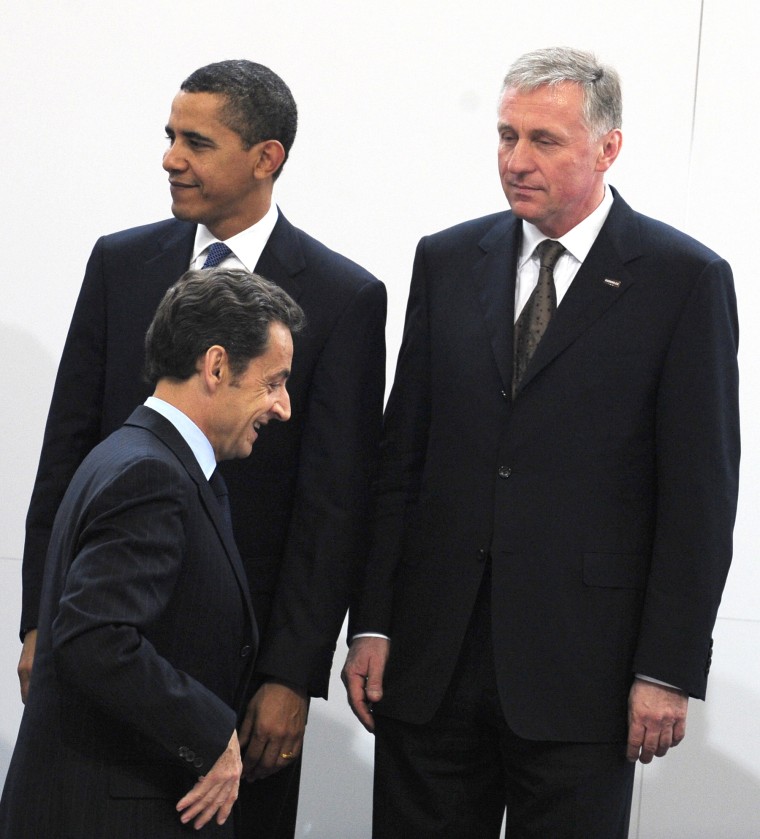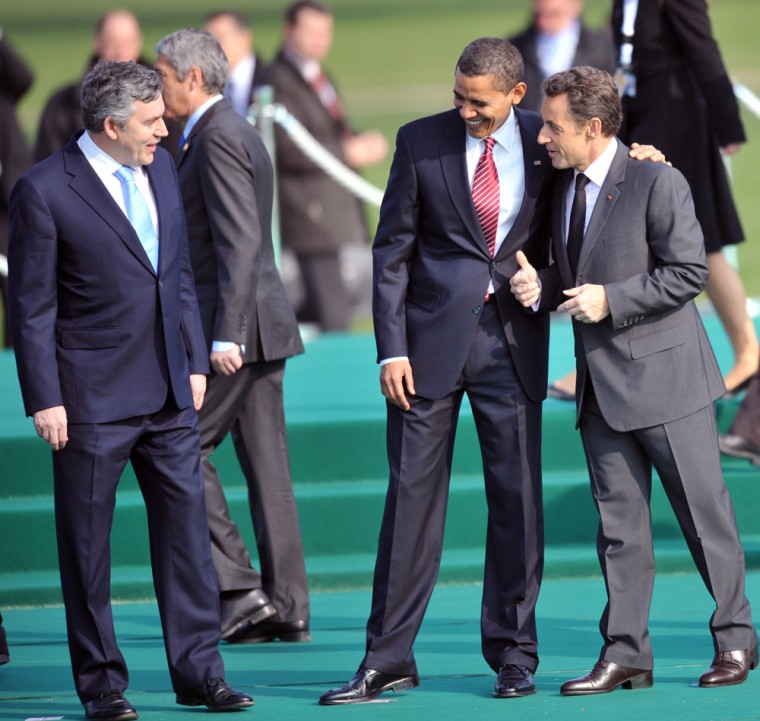It seems a shame to let the week go by without taking a deep breath and debriefing the first overseas trip by President Barack Obama.
Looking back — with a couple of days of rest — I have reached one big conclusion about the overall media coverage of the trip: We both over-covered and under-covered the eight-day marathon.
Specifically, the minutiae of the trip was over-covered, and the larger, over-arching set-up events were under-covered.
Let’s start with the three summits: G-20, NATO and the European Union.
All the summits were over-covered, while the one-on-one meetings the president had with world leaders didn't get nearly the attention they deserved.
Both the G-20 and NATO summits struck me as a tad unruly.
The EU meeting was a faux get-together from the get-go, hastily put together by the Czech Republic as an excuse to host Obama in Prague.
Tangible results?
But as for the other two, there’s a reason why so little came out of either summit.
Ask yourself, have you ever had a productive meeting with more than a dozen, let alone two dozen, folks around a table?
French President Nicolas Sarkozy had a point when he pre-criticized the G-20, expressing concern that any language the group could craft would be too broad (in order to win unanimous agreement) to accomplish anything tangible.
And what was binding out of the G-20?
The summit led to productive one-on-one meetings and smaller breakout groups, but trying to get the entire body to move as one proved nearly impossible.
Sure, there was general agreement, and perhaps having the G-20 collectively promise to name and shame countries acting as tax shelters was a good step toward creating a safer world banking system.
And it’s possible that the decision by the G-20 to recognize the International Monetary Fund as a more influential institution for global financial policy could shift the group from being a rescue fund for poor nations to, for lack of a better description, a global Federal Reserve.

Still, outside of some philosophical agreements by the 20 nations, it’s hard to identify exactly what else was accomplished at the big meeting.
Again, a lot can be said of the big conference leading to productive one-on-one meetings but as for the big gathering, not so much.
NATO's big development
As for NATO, it seems we all got distracted by the story about whether the president was going to be able to convince the group to commit more troops to Afghanistan. As a result, the truly big story about the meeting went unreported: NATO is searching for its 21st century rationale.
Seriously, shouldn’t that be the gigantic take-away from the NATO conference?
There it was, right at the top of the NATO "communiqué" — NATO’s decision to come up with a new strategic concept. It’s truly stunning, actually, that the organization continues to accept new members without having a future-minded vision of how its security umbrella will operate.
I’m not going to pretend that I’m a national security expert, but common sense dictates that an organization shouldn’t be expanding so aggressively without a strategic vision for the 21st century.
NATO's future potential for security success is predicated on success in Afghanistan but another question remains: When does the organization become too big to be useful?
At what point does NATO and the United Nations start bumping into one other? Is it nothing more than a Cold War relic that needs to be revamped?
Let’s move on to what else was under-covered. In eight days, Obama tackled some of the trickier international issues of the the next decade — and some didn't get the press they deserved.
Among them:
China: The decision to elevate contact with the nation to a “strategic and economic dialogue” strikes me as yet another acknowledgment that China is the chief rival of the United States for the 21st century. And while Obama said he did not view the U.S. and China as a “G-2,” the very fact that he uttered the phrase “G-2” suggests that it's probably closer to reality — meaning, there’s the U.S., China, and everyone else.
Nuclear proliferation: The president’s speech in Prague and the pledges he made after meeting with the Russian president indicate a real motivation on Obama's part to make progress on this issue. But how far is he willing to go? Will the U.S. and Russia (and China and India and Pakistan) ever actually abandon their nukes? This is where the president’s rhetoric might not match the goal. Still, the rhetoric opens the door for other nations to jump to the U.S. side against Iran.
Relations with the Muslim world: The Turkey visit didn’t get the attention it deserved, thanks in part to the president’s (not so) surprise trip to Iraq. The elevation of Turkey and Obama's ability to speak more directly with the Muslim world from a majority-Muslim nation was a big deal. Sure, it may be an optic, but it could lead to something big in the Middle East.
American exceptionalism: The president gave a fascinating answer to a foreign reporter’s question about “American exceptionalism.” It’s an issue many in the American intelligentsia have been concerned about and presidents usually duck this kind of philosophical talk — but Obama's answer probably made even the most isolationist conservative feel pretty good. "The fact that I am very proud of my country and I think that we've got a whole lot to offer the world does not lessen my interest in recognizing the value and wonderful qualities of other countries, or recognizing that we're not always going to be right, or that other people may have good ideas, or that in order for us to work collectively, all parties have to compromise and that includes us," said Obama.
Now, there are still questions that the president didn't answer that I thought he would during the trip (yes, we all wanted more time with him).
- Is the Taliban in Afghanistan a threat to the U.S. in the same way al-Qaida is?
- Why is he confident that Russian President Dmitry Medvedev is the one calling the shots and not Prime Minister Vladimir Putin?
- What does he make of Israel’s threat to handle Iran if the U.S. doesn’t?
- Is China the chief, superpower rival of the United States?
There are plenty of other questions, but I would have liked the president to expound upon these at some point.
Finally, let's assess how the president did as a world politician.
Europe vs. Iowa
Judged in this role, the trip was an unequivocal success for the president. In First Read, we compared this trip to an inaugural voyage to Iowa for a presidential candidate.
Everything felt good, all the key officials were in suck-up mode and the media was "gee-whizzing" with its coverage (particularly about first lady Michelle Obama) — but when it was all over, tangible successes were hard to find.
To be fair, I think the Obama administration is right when it says this trip was about supposed to be about planting seeds, just like a first trip Iowa is about seed planting.
The popularity of this president was impressive to watch.
World leaders were tripping over each other to be seen with him. Average Europeans gawked at his motorcade with more interest than even Americans have right now. One veteran European journalist even said to me that an American president hasn't been this popular in Europe since Eisenhower — and he saved the continent from destruction.
Everything gets judged through such a partisan prism these days, so we might not be appreciating American's global resurgence right now. It’s a remarkable moment for the nation, no matter what you think of the current president.
And now it's up to the president to take full advantage of his popularity and this moment.
He doesn’t lack for confidence, and like most new presidents, he seems to enjoy playing the role of world statesman, more so than having to act as an economic recoverer-in-chief.
He may have been elected to focus on domestic policy (as most modern presidents are) but when history is done with Barack Obama, we may discover that it was his abilities on the world stage that defined his tenure.
